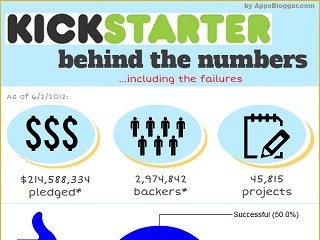
How does Kickstarter make money?
Kickstarter takes 5% from every successfully funded project

Of all of the many, many ways that the Internet has changed the world over the past two decades, the most important and exciting, at least to me, is the way it has opened up new avenues for creative people to express themselves.
There are now open platforms, like YouTube, on which anyone can express themselves. The Web has also put control back in the hands of the artist; remember how Louis C.K. bypassed Ticketmaster and sold tickets, at a lower price, directly to his fans? The middle man is out; artists can now appeal directly to potential fans.
This idea is also what is so exciting about crowdfunding platforms like Kickstarter.
Think back to the distant world of 10 years ago. If you had an amazing idea, but no connections, then that idea would basically remain in your head. You could try to get it out, but chances are it would go nowhere.
Now, everyone has a platform to put their ideas on. Having no connections is no longer an obstacle. All controveries over whether or not Zack Braff belong on it or not, Kickstarter is the ultimate level playing field.
But how does it make money?
Pretty simple, actually. If a project is successfully funded, Kickstarter applies a 5% fee to the funds collected.
So, let's do a little bit of math.
A total of $480 million was donated by three million people to 19,911 Kickstarter projects in 2013. That included both successful projects, unsuccessful projects and live projects, aka those projects that are still looking to raise money.
Kickstarter, however, does not hand over money to unsuccessful projects. If the project does not reach it's funding goal, then there are no fees collected.
"If the projects hits its deadline with a fraction of its funding goal and didn't cross the 100% mark, then backers' credit cards are not charged, and no money changes hands. Kickstarter applies no fee in those cases," a spokesperson for Kickstarter told me.
He also said that, historically, 89% of of dollars pledged are pledged to successfully funded projects.
So, given that information, we can take 89% of the $480 million pledged, then we get around $427.2 million that was given to successfully funded projects. Take the 5% that Kickstarter takes of that total and you get $21.36 million in funding for 2013.
Those numbers are obviously not exact (and does not account for whatever amount of money was going toward live projects) but it does give you a general idea of how much money Kickstarter is now seeing.
Its revenue increased healthily from 2012, when it saw $319 million, which was pledged by 2.24 million people, a nearly 50% increase.
In its entire history, the site has seen $962 million pledged, and $830 of that to projects that met their goal. Only $113 million went to unsuccessful projects, while the other $20 million has been pledged to live projects.
Some 5.5 million people have pledged money 13.2 million times.
(Image source: https://banklesstimes.com)
Related News


Kickstarter CEO Perry Chen steps down

Spike Lee surpasses Kickstarter goal, raises over $1.3M

Kickstarter on its way to Australia and New Zealand

Study: On Kickstarter, about 41% of projects fail

Spike Lee turns to Kickstarter to fund latest project


